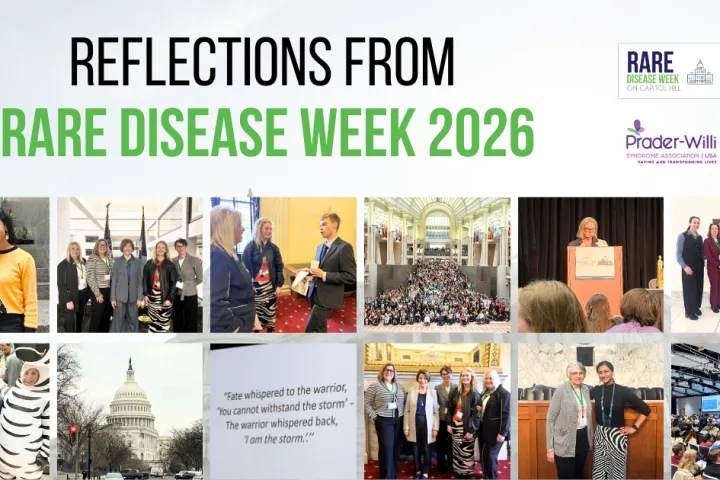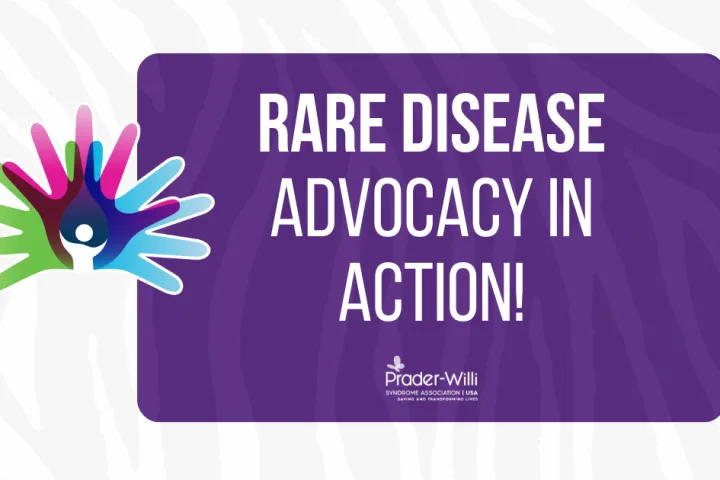PWSA (USA) is sponsoring a grant that will bring therapy to the home!
PWSA (USA) Joseph McErlane Research Grant
Project Title: Evaluating the Feasibility of a Telehealth Intervention of Early Social Cognitive Processes in Children with Prader-Willi syndrome
Principal Investigator: Anastasia Dimitropoulos, Associate Professor of Psychology, Ph.D.
Case Western Reserve University, Cleveland, OH
Relevance of this study:
Current research in typically developing children has shown that pretend play, the ability to play with toys in an imaginative way, is related to important areas of development, such as social-emotional understanding. Research has also shown that individuals with PWS have difficulty in social situations, in emotionally understanding others, and have difficulties with regulating their behavior and emotions in difficult situations. Since many children with PWS have trouble with social-emotional skills, intervention targeting these skills through pretend play could increase quality of life while also decreasing problem behaviors, as has been shown in children with other developmental disabilities.
Through this grant, they will administer intervention in the participant’s home (using telehealth videoconferencing) to increase its accessibility to the PWS population. If feasibility and improvements are found, these results will lead to establishing a practical treatment alternative for families dealing with Prader-Willi syndrome.
Eligible participants will be children with PWS between 5-11 years of age. Individuals without Internet capable computers will be excluded from participation; however, equipment will be available for participating families who do not have necessary components (i.e., webcam). Details of participant eligibility will be available in the near future on PWSA (USA)’s website and Face Book pages.
(Note: Wouldn’t it be wonderful if we could provide help for families that live far from major treatment centers and spare all families dealing with PWS from some of the multiple trips needed to get the proper intervention? We see this pilot project as the 1st step in bringing this type of intervention to your home. It’s the wave of the future! ~ Janalee)





 Perry A. Zirkel has written more than 1,500 publications on various aspects of school law, with an emphasis on legal issues in special education. He writes a regular column for NAESP’s Principal magazine and NASP’s Communiqué newsletter, and he did so previously for Phi Delta Kappan and Teaching Exceptional Children.
Perry A. Zirkel has written more than 1,500 publications on various aspects of school law, with an emphasis on legal issues in special education. He writes a regular column for NAESP’s Principal magazine and NASP’s Communiqué newsletter, and he did so previously for Phi Delta Kappan and Teaching Exceptional Children. Jennifer Bolander has been serving as a Special Education Specialist for PWSA (USA) since October of 2015. She is a graduate of John Carroll University and lives in Ohio with her husband Brad and daughters Kate (17), and Sophia (13) who was born with PWS.
Jennifer Bolander has been serving as a Special Education Specialist for PWSA (USA) since October of 2015. She is a graduate of John Carroll University and lives in Ohio with her husband Brad and daughters Kate (17), and Sophia (13) who was born with PWS. Dr. Amy McTighe is the PWS Program Manager and Inpatient Teacher at the Center for Prader-Willi Syndrome at the Children’s Institute of Pittsburgh. She graduated from Duquesne University receiving her Bachelor’s and Master’s degree in Education with a focus on elementary education, special education, and language arts.
Dr. Amy McTighe is the PWS Program Manager and Inpatient Teacher at the Center for Prader-Willi Syndrome at the Children’s Institute of Pittsburgh. She graduated from Duquesne University receiving her Bachelor’s and Master’s degree in Education with a focus on elementary education, special education, and language arts. Evan has worked with the Prader-Willi Syndrome Association (USA) since 2007 primarily as a Crisis Intervention and Family Support Counselor. Evans works with parents and schools to foster strong collaborative relationships and appropriate educational environments for students with PWS.
Evan has worked with the Prader-Willi Syndrome Association (USA) since 2007 primarily as a Crisis Intervention and Family Support Counselor. Evans works with parents and schools to foster strong collaborative relationships and appropriate educational environments for students with PWS. Staci Zimmerman works for Prader-Willi Syndrome Association of Colorado as an Individualized Education Program (IEP) consultant. Staci collaborates with the PWS multi-disciplinary clinic at the Children’s Hospital in Denver supporting families and school districts around the United States with their child’s Individual Educational Plan.
Staci Zimmerman works for Prader-Willi Syndrome Association of Colorado as an Individualized Education Program (IEP) consultant. Staci collaborates with the PWS multi-disciplinary clinic at the Children’s Hospital in Denver supporting families and school districts around the United States with their child’s Individual Educational Plan. Founded in 2001, SDLC is a non-profit legal services organization dedicated to protecting and advancing the legal rights of people with disabilities throughout the South. It partners with the Southern Poverty Law Center, Protection and Advocacy (P&A) programs, Legal Services Corporations (LSC) and disability organizations on major, systemic disability rights issues involving the Individuals with Disabilities Education Act (IDEA), Americans with Disabilities Act (ADA), and the federal Medicaid Act. Recently in November 2014, Jim retired.
Founded in 2001, SDLC is a non-profit legal services organization dedicated to protecting and advancing the legal rights of people with disabilities throughout the South. It partners with the Southern Poverty Law Center, Protection and Advocacy (P&A) programs, Legal Services Corporations (LSC) and disability organizations on major, systemic disability rights issues involving the Individuals with Disabilities Education Act (IDEA), Americans with Disabilities Act (ADA), and the federal Medicaid Act. Recently in November 2014, Jim retired.